Research / Areas of ResearchEnergy and Sustainability
Developing efficient energy conversion, energy utilization, water management, and pollution mitigation solutions with minimal environmental impact
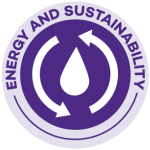
Sustainable access to energy and clean water using low carbon emission technologies is essential to address climate change. We are inventing new technological solutions using integrated approaches rooted in computational mechanical-material science, surface engineering, thermo-fluids science and engineering, design, and manufacturing.
View energy and sustainability faculty
![]()
Research Area Subtopics

of buildings. (W. Chen, C. Sun)
Energy Conversion and Storage
Increasing energy demand needs to be met without adversely affecting the environment. This is possible only with clean and efficient energy supply technologies. To that end, we are designing, fabricating, and testing novel materials for more efficient solar, thermal (steam), and chemical (solid-state batteries) energy conversion and storage systems.
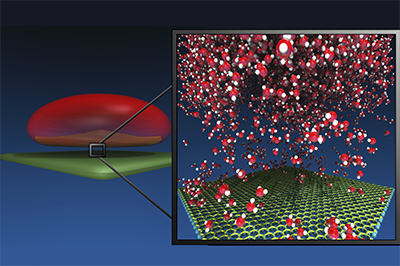
(N. Patankar, T. Zhao)
Efficient Energy Utilization
Reduction of greenhouse emissions relies on efficient energy utilization, which can be accomplished by designing effective energy-matter interaction and low-friction interface. We are developing new technologies to mitigate problems due to icing and fouling, reduce friction and wear at surfaces in contact, and improve efficiency in HVAC and thermal transport systems.
View video about efficient energy utilization
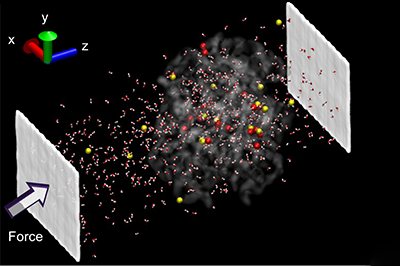
nanofiltration membrane. (R. Lueptow, S. Keten)
Water Management
The United Nations estimates that approximately two thirds of the world population will suffer from water stress by 2025. New technologies to reduce water use and to recycle water are needed. We are innovating fog and dew collection, filtration, and brine purification technologies to reduce water use in energy, agricultural, and manufacturing sectors.
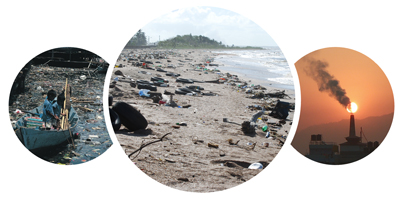
License)
Pollution Mitigation
Microplastic particles, oil spills, and smog are representative examples of water and air pollution. Innovative solutions based on interfacial and transport phenomena are urgently needed to solve these problems. To address this challenge, we are developing technologies to capture smog and toxic liquid drops from air, and microplastics and oil from water.
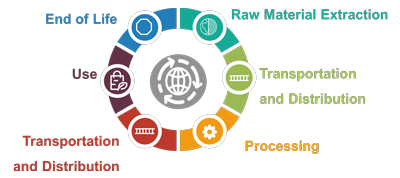
assessing the sustainability of manufactured products.
(J. Dunn)
Cradle-to-cradle Sustainability Analysis
We work in interdisciplinary teams to design and deploy new energy, water, and materials systems that address environmental and societal challenges. Examples include bio-derived electronics designed for circularity, polymers that incorporate renewable feedstocks and are designed for recyclability, and membranes that improve energy and nutrient recovery in water treatment systems.![]()
ME Faculty
Oluwaseyi Balogun
Associate Professor of Civil and Environmental Engineering and Mechanical Engineering
Sandip Ghosal
Associate Professor of Mechanical Engineering and (by courtesy) Engineering Sciences and Applied Mathematics
Richard Lueptow
Professor of Mechanical Engineering and (by courtesy) Chemical and Biological Engineering
Senior Associate Dean
Neelesh Patankar
Professor of Mechanical Engineering and (by courtesy) Engineering Sciences and Applied Mathematics
Director, NAISE
John Rudnicki
Professor of Civil and Environmental Engineering and Mechanical Engineering
Q. Jane Wang
Joseph Cummings Professor in Mechanical Engineering
Executive Director, Center for Surface Engineering and Tribology
Courtesy Faculty
Zdeněk Bažant
McCormick Institute Professor, Walter P. Murphy Professor of Civil and Environmental Engineering, and (by courtesy) Mechanical Engineering and Material Science and Engineering
Jennifer Dunn
Professor of Chemical and Biological Engineering and (by courtesy) Mechanical Engineering
Director, Center for Engineering Sustainability and Resilience
Associate Director, Northwestern-Argonne Institute of Science and Engineering
Julio Ottino
Walter P. Murphy Professor of Chemical and Biological Engineering and (by courtesy) Mechanical Engineering
Distinguished Robert R. McCormick Institute Professor
Professor of Management and Organizations, Kellogg School of Management
Aaron Packman
Professor of Civil and Environmental Engineering and (by courtesy) Mechanical Engineering and Chemical and Biological Engineering












